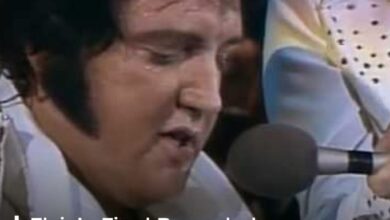Restored in 2024, Elvis’s 1970 performance remains as relevant to listeners today as when it was first sung
Elvis Presley’s live performance of “In the Ghetto” in 1970 at The International Hotel in Las Vegas marked a significant moment in his storied career. This particular performance occurred during a period of immense social upheaval in America, characterized by civil rights movements and rising awareness of poverty. The song’s narrative, crafted by songwriter Mac Davis, poignantly explores the cycle of poverty and violence that traps individuals in despair. Presley’s rendition resonated deeply with audiences, not merely as entertainment but as a reflection of the struggles many faced during this turbulent time.
Standing on the iconic stage of The International Hotel, Presley commanded the attention of a packed audience, his charisma palpable as he delivered each lyric with a fervor that conveyed genuine empathy. The way he conveyed the song’s narrative was not only powerful but also heart-wrenching, drawing listeners into the world he was describing. Each note seemed to echo the cries of the marginalized, and his emotional delivery became a vehicle for social consciousness, transforming a typical Las Vegas performance into a moment of significance and reflection.
The performance took place during one of Elvis’s legendary runs in Las Vegas, where he revitalized his career after a lengthy hiatus from live shows. The International Hotel had become synonymous with his name during this era, hosting hundreds of performances that showcased both his legendary status and his growth as an artist. This particular venue buzzed with excitement, but within that electric atmosphere, “In the Ghetto” emerged as a standout moment that juxtaposed the glamour of Vegas with a sobering message about social injustice.
Presley’s ability to connect with the audience was enhanced by the incredible musicianship of his band, which featured guitar virtuoso James Burton. The synergy between Elvis and his band created a rich musical landscape that supported the poignant storytelling of “In the Ghetto.” The Sweet Inspirations and The Imperials, his backing vocalists, infused the performance with gospel harmonies that added depth and emotional weight to the song. Their contributions were not merely background vocals; they transformed the performance into a soulful experience that resonated with the audience’s hearts.
Elvis’s stage presence was nothing short of mesmerizing. Known for his captivating movements and deep emotional connection with the crowd, he brought a unique intensity to “In the Ghetto.” As he sang, his expressions conveyed the pain and urgency of the lyrics, allowing the audience to feel as though they were experiencing the story alongside him. This ability to draw people in and make them feel a part of the performance is a hallmark of his legacy, establishing him as a performer who could move beyond mere entertainment to touch the human spirit.
The song’s themes of social neglect and the cyclical nature of violence spoke to many during a time of widespread discontent in America. By this point in his career, “In the Ghetto” had solidified its place as one of Elvis’s signature songs. It was a clear reflection of his growing engagement with socially conscious material, revealing a side of him that went beyond the glitz and glamour typically associated with his performances. This authenticity resonated strongly with fans, reaffirming their belief in his artistry and depth.
This Las Vegas performance also symbolized a pivotal moment in Elvis’s artistic journey, showcasing his transition from a focus on film back to the stage. After years of primarily acting, his return to live performance was a triumphant homecoming, marked by a newfound seriousness and dedication to his craft. The engagement at The International Hotel allowed him to blend his entertainment roots with a more profound artistic expression, and songs like “In the Ghetto” played a crucial role in re-establishing him as a serious musician.
The emotional impact of this performance has endured over the decades. Elvis’s interpretation of “In the Ghetto” remains relevant today, reflecting ongoing societal issues that continue to resonate with listeners. His performance serves as a reminder of the power of music as a tool for social commentary, illustrating that artists can use their platforms to shed light on pressing issues. This timeless quality of the song underscores Elvis’s lasting influence, not just in the realm of music but as a cultural icon capable of provoking thought and encouraging dialogue.
Elvis Presley was not just a performer; he was a cultural phenomenon. Born in Tupelo, Mississippi, in 1935, he rose to fame in the 1950s as the King of Rock ‘n’ Roll, blending genres like rock, country, and gospel to create a sound that captivated millions. His charisma, good looks, and unique voice made him a sensation, but it was his ability to convey deep emotion that truly set him apart. Throughout his career, he pushed boundaries and challenged societal norms, using his influence to address complex themes through his music.
Ultimately, the performance of “In the Ghetto” at The International Hotel stands as a testament to Elvis Presley’s legacy as an artist who transcended the boundaries of entertainment. It illustrates his capacity for empathy, his awareness of the human condition, and his dedication to communicating important messages through music. The song not only highlighted his vocal prowess but also cemented his status as an artist who understood the power of his platform, creating a profound connection with audiences that continues to resonate today.



